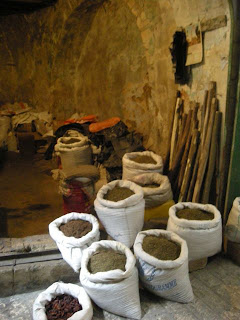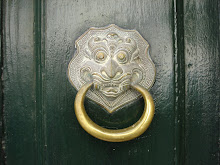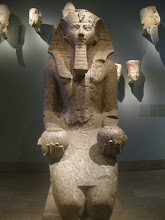On Sunday, the rain was pouring down on Palestine. It gushed forth from the clouds as if great buckets were being emptied onto us as a part of an early spring cleaning from the sky.
It took us a little by surprise, the icy bucket loads of water pouring down on us, as we got out of the car to show two Italian girls the old city of Al-Khalil (Hebron). We hadn't expected it, although we always welcome all the rain we can get in the winter so that the olive trees can produce enough olives for us in the fall to make our golden green olive oil that we eat with everything.
Yes. I learned here in Palestine to eat olive oil with everything. Drench my bread in it, drizzle it over hummus, vegetables, cheese. I never knew it tasted so good.
The rain poured down on us, but to my surprise at least 15 shop owners had ventured to fling open their doors open and line up their olives, pickles, raisins, sweets and spices beside beduin carpets, traditional embroidery, scarves and touristy trinkets. In spite of the rain, the Jewish settlers and the Israeli soldiers.
I had never seen so many shops open at once in Al-Khalil. Tarek told me and the Italian girls that the Khalilis are making a concerted effort to stand up against the settler violence and harassment and sort of protest by carrying on their lives as if everything were as it should in Al-Khalil.
But it isn't.
The Ibrahimi Mosque is still separated from the predominantly Palestinian part of the old city by a two-turnstile, two-metal-detector checkpoint, manned by armed Israeli soldiers that control and intimidate.
The Mosque is still partitioned into two parts by the Israelis; one side for Muslims, and one side for Jews.
Rooftops are still guarded by green clad soldiers; settlers still drive their cars at top speed through the neighborhoods, splashing freezing cold water on Palestinian children.
We walked down Shuhada Street, where Palestinians aren't allowed to walk except on a narrow stretch on one side of the street, cordoned off by a cement barrier, watched over by Israeli soldiers. Palestinians are only allowed to walk on this narrow stretch of their old street so that they can pass from one side of the city to the other. The rest of the street, and everything that's in front of you and behind you if you should stand in the middle, the settlers have taken over completely.
Shuhada Street is the same street where doors and windows of houses have been welded shut by the Israeli military so that the Palestinian inhabitants have to climb up on the roof, over to their neighbors' houses, and down on a parallel street to be able to go out at all. So that the Jews don't have mix with the locals.
The rain poured down, and collected itself in streams on the ground that washed sand and gravel onto the streets.
A group of Israeli soldiers came walking down from where the Jews-only part of the Ibrahimi Mosque is, over to two armored vehicles that they had parked in an area where Palestinians are still allowed to walk.
A young Palestinian girl with dark brown curly hair tied in a little bun struggled with a baby stroller loaded with white sacks, stuck in the gravel and the puddles.
She had been to collect sacks of grains, perhaps rice, and probably flour from ICRC. Around 7 000 Palestinians in the old city of Al-Khalil depend on humanitarian aid in the form of food from ICRC every month. But because Palestinians aren't allowed to drive in the old city, they have to lug the sacks over long distances, down the streets they are still allowed to walk on, past checkpoints.
On Sunday, it was little Shaimaa's turn to get the ICRC sacks. Perhaps her parents were sick. I don't know.
Her younger brother Shadi helped her push the stroller through the gravel, but neither one of them was strong enough to keep it rolling straight. It kept turning the wrong way, getting stuck and refusing to move. Their hair was wet and their fingers purple from the cold.
Tarek walked up to them, took over the steering for a moment to prevent the stroller from getting stuck in a particularly huge puddle.
Then he came over to us again, only to say,
"Honey, do you have my mittens with you?"
"Yes," I said, immediately understanding what he was thinking. Glad that he thinks this way.
I produced his brand new mittens we had bought in Cairo from my purse, and handed them to him.
"Thanks," he said and walked back to Shaimaa and Shadi.
He took the cold little hands of the girl in his and pulled the mittens on, finger by finger.
I wanted to take a picture, but felt it would somehow not be right. Instead I asked the girl what her name was.
"Shaimaa," she said so timidly I almost couldn't hear her.
"And you?" I asked the boy.
"Shadi."
"Where do you live?" Tarek wanted to know.
"Just around the corner," Shaimaa answered.
"Okay." Tarek put her hands on the handle and told Shadi to stick his hands in his pockets. "Yalla."
Shaimaa and Shadi pushed the stroller around the corner, and we tried to walk back towards the car. But apparently we took a wrong turn somewhere because we were stopped by soldiers who wouldn't let us take a short cut in spite of the heavy rain. Tarek is a Palestinian, after all. And these are Jews-only streets.

It took us a little by surprise, the icy bucket loads of water pouring down on us, as we got out of the car to show two Italian girls the old city of Al-Khalil (Hebron). We hadn't expected it, although we always welcome all the rain we can get in the winter so that the olive trees can produce enough olives for us in the fall to make our golden green olive oil that we eat with everything.
Yes. I learned here in Palestine to eat olive oil with everything. Drench my bread in it, drizzle it over hummus, vegetables, cheese. I never knew it tasted so good.
The rain poured down on us, but to my surprise at least 15 shop owners had ventured to fling open their doors open and line up their olives, pickles, raisins, sweets and spices beside beduin carpets, traditional embroidery, scarves and touristy trinkets. In spite of the rain, the Jewish settlers and the Israeli soldiers.
One of those stores in Al-Khalil I never saw open before
Beautiful hand-embroidered Palestinian clothes for sale in Al-Khalil
I had never seen so many shops open at once in Al-Khalil. Tarek told me and the Italian girls that the Khalilis are making a concerted effort to stand up against the settler violence and harassment and sort of protest by carrying on their lives as if everything were as it should in Al-Khalil.
But it isn't.
The Ibrahimi Mosque is still separated from the predominantly Palestinian part of the old city by a two-turnstile, two-metal-detector checkpoint, manned by armed Israeli soldiers that control and intimidate.
Palestinians passing the Israeli military checkpoint that divides their city
The Mosque is still partitioned into two parts by the Israelis; one side for Muslims, and one side for Jews.
Rooftops are still guarded by green clad soldiers; settlers still drive their cars at top speed through the neighborhoods, splashing freezing cold water on Palestinian children.
We walked down Shuhada Street, where Palestinians aren't allowed to walk except on a narrow stretch on one side of the street, cordoned off by a cement barrier, watched over by Israeli soldiers. Palestinians are only allowed to walk on this narrow stretch of their old street so that they can pass from one side of the city to the other. The rest of the street, and everything that's in front of you and behind you if you should stand in the middle, the settlers have taken over completely.
Shuhada Street is the same street where doors and windows of houses have been welded shut by the Israeli military so that the Palestinian inhabitants have to climb up on the roof, over to their neighbors' houses, and down on a parallel street to be able to go out at all. So that the Jews don't have mix with the locals.
The rain poured down, and collected itself in streams on the ground that washed sand and gravel onto the streets.
A group of Israeli soldiers came walking down from where the Jews-only part of the Ibrahimi Mosque is, over to two armored vehicles that they had parked in an area where Palestinians are still allowed to walk.
Israeli soldiers on their way to their armored cars in Al-Khalil
A young Palestinian girl with dark brown curly hair tied in a little bun struggled with a baby stroller loaded with white sacks, stuck in the gravel and the puddles.
She had been to collect sacks of grains, perhaps rice, and probably flour from ICRC. Around 7 000 Palestinians in the old city of Al-Khalil depend on humanitarian aid in the form of food from ICRC every month. But because Palestinians aren't allowed to drive in the old city, they have to lug the sacks over long distances, down the streets they are still allowed to walk on, past checkpoints.
On Sunday, it was little Shaimaa's turn to get the ICRC sacks. Perhaps her parents were sick. I don't know.
Her younger brother Shadi helped her push the stroller through the gravel, but neither one of them was strong enough to keep it rolling straight. It kept turning the wrong way, getting stuck and refusing to move. Their hair was wet and their fingers purple from the cold.
Tarek walked up to them, took over the steering for a moment to prevent the stroller from getting stuck in a particularly huge puddle.
Then he came over to us again, only to say,
"Honey, do you have my mittens with you?"
"Yes," I said, immediately understanding what he was thinking. Glad that he thinks this way.
I produced his brand new mittens we had bought in Cairo from my purse, and handed them to him.
"Thanks," he said and walked back to Shaimaa and Shadi.
He took the cold little hands of the girl in his and pulled the mittens on, finger by finger.
I wanted to take a picture, but felt it would somehow not be right. Instead I asked the girl what her name was.
"Shaimaa," she said so timidly I almost couldn't hear her.
"And you?" I asked the boy.
"Shadi."
"Where do you live?" Tarek wanted to know.
"Just around the corner," Shaimaa answered.
"Okay." Tarek put her hands on the handle and told Shadi to stick his hands in his pockets. "Yalla."
Shaimaa and Shadi pushed the stroller around the corner, and we tried to walk back towards the car. But apparently we took a wrong turn somewhere because we were stopped by soldiers who wouldn't let us take a short cut in spite of the heavy rain. Tarek is a Palestinian, after all. And these are Jews-only streets.
A blocked street in Al-Khalil, with graffiti that reads Forgiveness























2 comments:
Have you been in the Jewish section of the mosque? its actually smaller, and has covered over a courtyard to make another room.
It does, however, control total access to the outdoor plaza and gardens at the other entrance. Which are stunning.
Actually no, I have not been to the Jewish-controlled section. I generally don't visit places that Palestinians are denied entry to, as a way to make a quiet stand against Israel's separation policies.
Since I do not know the actual percentage that Israel controls, I shouldn't have written anything about it. I have googled it, but can't seem to find a reliable source. I will remove the part in my blog where I imply that the Jewish side is bigger.
However, Israel still controls access to all sections of the mosque, since no Palestinian is allowed entry without passing at least one Israeli checkpoint first.
Post a Comment